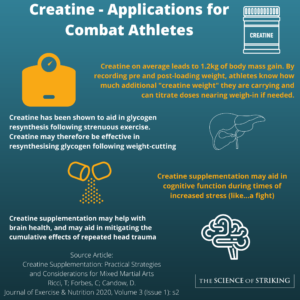BACKGROUND
Creatine is one of the most well-researched and commonly used athletic ergogenic aids. It is known to positively benefit singular and repeated high intensity bouts of exercise, muscular endurance, and hypertrophic and strength adaptations to resistance exercise.
METHODS
The authors of this study primarily applied findings of creatine research in related topics to discuss potential application to mixed martial arts
FINDINGS
The primary findings of the authors were:
- The small number of laboratory studies on combat sports athletes failed to demonstrate a significant effect. However, given the large body of evidence demonstrating benefits of creatine in repeated bout sports, it is likely that further research into the specific effects of creatine supplementation in combat athletes is required.
- The increase is osmolarity following chronic creatine consumption on average leads to a 1.2kg weight gain. One potential strategy is to measure the pre-loading and post-loading body mass of the athlete, consider this a potential amount of weight that may be lost pre-fight, and as the athlete approaches competition, creatine dosage may be titrated to aid in decreasing body mass prior to weigh-in.
- Creatine has been shown to aid in replenishing glycogen stores following intense exercise. This is of particular relevance to combat sports athletes, as the weight-cutting process results in glycogen depletion, and one of the primary goals post-weight cut is to replenish glycogen.
- Creatine has been shown to increase cognitive function under conditions of stress, which may be of relevance for match conditions
- Brain creatine levels may be reduced following repetitive head trauma and creatine supplementation has been shown to increase brain recovery in rodent studie. Therefore, there may be some utility in chronic creatine supplementation in optimising long-term brain health in those athletes acquiring repeated head trauma, as well as acute supplementation to enhance recovery from acute traumatic brain injury
